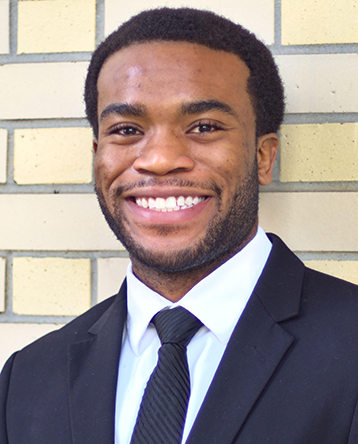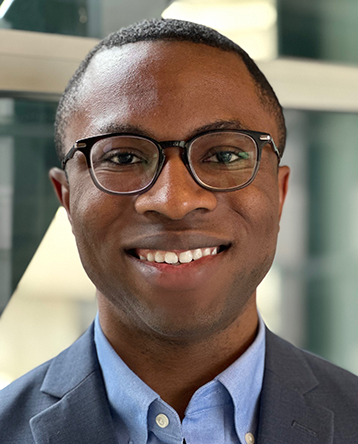NextM Seminar: Agwu and Ogoke
March 12, 2024
9:00 a.m. ET
Scott 6142
March 12, 2024
9:00 a.m. ET
Scott 6142
Next Manufacturing Center seminars are open to Center members, as well as other interested members of the CMU community. Next Manufacturing Center Consortium members are able to participate online.
Speaker: Uche Agwu, Mechanical Engineering
 Designing low thermal expansion structures is important in various engineering fields, especially within the aerospace industry. When considering optical instruments used in space, for example, their support structures must be designed to withstand the thermal extremes of space. The supports for these instruments must have minimal thermal expansion displacements to maintain specific stability and pointing deviations to operate correctly. Typically, the supports are made of materials with a low coefficient of thermal expansion (CTE), such as Invar. These materials can be expensive and operate within a narrow temperature range. Therefore, researchers have developed geometric designs and material combinations with positive CTEs, but there is a substantial CTE differential between the materials that create dissimilar thermal expansion. This allows for the structures to have controllable effective CTEs, ranging from low, zero, and even negative CTEs. Generally, adhesives, snap-fit joints, or welds are used to combine different metals, however, there has been limited work in trying to design these geometries with metal additive manufacturing. This seminar explores the feasibility of using muti-material/bimetallic additive manufacturing to develop controllable effective CTE triangular structures. The materials used are IN625 and SS316 as they are known to bond well together. The triangular structures are printed using directed energy deposition and undergo thermal expansion testing. Numerical and analytical models are developed and validated through the results of the test. The numerical models closely simulated the experimental thermal expansion, with an average percentage difference of around 5%. These results validated the bimetallic triangular design concept, leading to the creation of a bimetallic support structure for an optical instrument that meets all critical requirements.
Designing low thermal expansion structures is important in various engineering fields, especially within the aerospace industry. When considering optical instruments used in space, for example, their support structures must be designed to withstand the thermal extremes of space. The supports for these instruments must have minimal thermal expansion displacements to maintain specific stability and pointing deviations to operate correctly. Typically, the supports are made of materials with a low coefficient of thermal expansion (CTE), such as Invar. These materials can be expensive and operate within a narrow temperature range. Therefore, researchers have developed geometric designs and material combinations with positive CTEs, but there is a substantial CTE differential between the materials that create dissimilar thermal expansion. This allows for the structures to have controllable effective CTEs, ranging from low, zero, and even negative CTEs. Generally, adhesives, snap-fit joints, or welds are used to combine different metals, however, there has been limited work in trying to design these geometries with metal additive manufacturing. This seminar explores the feasibility of using muti-material/bimetallic additive manufacturing to develop controllable effective CTE triangular structures. The materials used are IN625 and SS316 as they are known to bond well together. The triangular structures are printed using directed energy deposition and undergo thermal expansion testing. Numerical and analytical models are developed and validated through the results of the test. The numerical models closely simulated the experimental thermal expansion, with an average percentage difference of around 5%. These results validated the bimetallic triangular design concept, leading to the creation of a bimetallic support structure for an optical instrument that meets all critical requirements.
Speaker: Francis Ogoke, Mechanical Engineering
 Porosity defects in additively manufactured products can significantly degrade mechanical performance. While the mechanical performance of these products can be evaluated through either destructive testing or non-destructive simulations, accurate performance predictions require a thorough understanding of the pore distribution. However, the distribution of pores within a component can vary under fixed process conditions, and this variability needs to be considered when simulating component performance. Therefore, I will present a method for characterizing experimentally observed defect distributions and synthesizing new examples of porous parts. In order to efficiently generate new parts, the overall generation problem is deconstructed into smaller sub-tasks. Specifically, the distribution of pore structures is first captured and sampled with 3D Generative Adversarial Networks, and the surface roughness profile of the synthesized part is constructed with auto-correlation methods. This information is then probabilistically recombined to create new examples of a porous printed part. The generated parts are compared to experimental porosity distributions based on statistical and dimensional metrics. The ability to generate new parts by sampling from the distribution of defects provides greater insight into the link between process, structure variation, and performance.
Porosity defects in additively manufactured products can significantly degrade mechanical performance. While the mechanical performance of these products can be evaluated through either destructive testing or non-destructive simulations, accurate performance predictions require a thorough understanding of the pore distribution. However, the distribution of pores within a component can vary under fixed process conditions, and this variability needs to be considered when simulating component performance. Therefore, I will present a method for characterizing experimentally observed defect distributions and synthesizing new examples of porous parts. In order to efficiently generate new parts, the overall generation problem is deconstructed into smaller sub-tasks. Specifically, the distribution of pore structures is first captured and sampled with 3D Generative Adversarial Networks, and the surface roughness profile of the synthesized part is constructed with auto-correlation methods. This information is then probabilistically recombined to create new examples of a porous printed part. The generated parts are compared to experimental porosity distributions based on statistical and dimensional metrics. The ability to generate new parts by sampling from the distribution of defects provides greater insight into the link between process, structure variation, and performance.
February 17 2026
9:00 AM - 4:00 PM ET
Virtual
February 26 2026
12:30 PM ET
Next Manufacturing
New faculty highlight with Liwei Wang, Assistant Professor, Mechanical Engineering
Scott 6142
March 23 2026
12:30 PM ET
Next Manufacturing
New faculty highlight with Francis Ogoke, Assistant Professor, Mechanical Engineering
Scott 6142
April 6 2026
12:00 PM ET
Next Manufacturing
New faculty highlight with Misha Khrenov, Ph.D. Candidate, Mechanical Engineering
Scott 6142
April 24 2026
10:00 AM ET
Next Manufacturing
Yash Parikh, Ph.D., Process Engineering Consultant, EOS North America
TBD